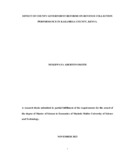Please use this identifier to cite or link to this item:
http://ir-library.mmust.ac.ke:8080/xmlui/handle/123456789/2528| Title: | EFFECT OF COUNTY GOVERNMENT REFORMS ON REVENUE COLLECTION PERFORMANCE IN KAKAMEGA COUNTY, KENYA. |
| Authors: | OKOTH, MUKHWAYA ABERTON |
| Keywords: | COUNTY GOVERNMENT REFORMS REVENUE COLLECTION REVENUE COLLECTION PERFORMANCE KAKAMEGA COUNTY |
| Issue Date: | 2023 |
| Abstract: | Globally, revenue is viewed as a critical element of any state as it provides needed finances used to support key government projects such as investment in human capital, infrastructural development, and administering services to citizens and businesses. Kakamega County initiated revenue reforms in 2019 to improve revenue collection. However, the county is still experiencing massive deficits and shortfalls in its revenue collection which has hindered the completion of key projects and caused inefficiencies in service provision. The study specifically examined the effect of County government reforms on revenue collection performance in Kakamega County. The study addressed four specific objectives which include; to examine the effect of cashless reform on revenue collection performance, determining the effect of Public Sector Revenue Management (PSRM) system reform on revenue collection performance and then to analyze the effect of toll fee reform on revenue collection performance in Kakamega County. Finally, to examine the moderating effect of inflation on revenue collection performance and revenue reforms in Kakamega County. The following theories informed the study; Revenue diversification theory, expediency theory of taxation, Keynesian theory on taxation and classical taxation theory. A comparative analysis was carried out to find out the effect of reforms on revenue collection using secondary data before the reforms and after the reforms. Descriptive, correlational and causal comparative research designs were chosen by the study. Secondary data was collected for thirty six-month period before the revenue reforms as from July 2016 to June 2019 and thirty-six-month period after the revenue reforms as from July 2019 to June 2022. Data in this research was analyzed using both descriptive and inferential statistics. Descriptive statistics measured were: mean, standard deviation, minima and maxima. Pearson Correlation coefficient was also calculated. In the study, pre-estimation diagnostics tests included Unit root and Philip Perron tests for stationarity. Results indicated that after reforms, parking fee had a moderate positive relationship with revenue collection performance (0.450), PSRM system reform had a strong positive relationship with revenue collection performance (0.641), toll fee had a moderate positive relationship with revenue collection performance (0.473) and Inflation as the moderating variable had a weak negative relationship with revenue collection performance (-0.291). From regression analysis, model estimates after reforms were (0.184, p< 0.05), (0.131, p<0.05) and (0.263, p<0.05) for cashless system reform, toll fee reform and PSRM system reform respectively. The study further indicated that inflation as a moderating variable was statistically significant (-0.154, p<0.05). Post estimation diagnostics tests carried out include; Breusch-Godfrey LM test which revealed that there is no autocorrelation, the Variance Inflation Factors (VIF) that showed there's no multicollinearity, Breusch -Pagan test whose results showed the error terms were homoscedastic and at last the Jarque-Bera test that showed that residuals are normally conveyed. To enhance performance and collection of revenue, the study recommended that Kakamega County should come up with modern ways of revenue collection. Additionally, the County should come up with a simplified and cost-effective system to enhance revenue collection. The study further recommended severe sanctions on tax evaders. The discoveries from research will be utilized by policy makers to enhance revenue collection within Kakamega County. Also, the findings will help the Kakamega County Revenue Agency (KCRA) staff to give insights on policy reforms within the county and their causal effect on revenue collection performance. |
| URI: | http://ir-library.mmust.ac.ke:8080/xmlui/handle/123456789/2528 |
| Appears in Collections: | School of Business and Economics |
Files in This Item:
| File | Description | Size | Format | |
|---|---|---|---|---|
| FINE COPY WORD.pdf | 1.81 MB | Adobe PDF |  View/Open |
Items in DSpace are protected by copyright, with all rights reserved, unless otherwise indicated.
